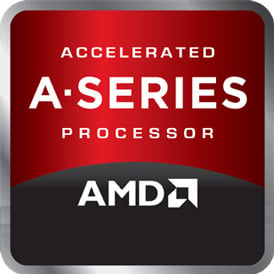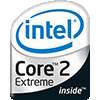
AMD A10-7870K Benchmark, Test and specs
Last updated:
The AMD A10-7870K has 4 cores with 4 threads and is based on the 4. gen of the AMD A series. The processor uses a mainboard with the FM2+ socket and was released in Q2/2015. The AMD A10-7870K scores 526 points in the Geekbench 5 single-core benchmark. In the Geekbench 5 multi-core benchmark, the result is 1,603 points.

| Name: | AMD A10-7870K |
|---|---|
| Family: | AMD A (112) |
| CPU group: | AMD A10-7000 (7) |
| Architecture: | Kaveri (Steamroller) |
| Segment: | Mobile |
| Generation: | 4 |
| Predecessor: | -- |
| Successor: | -- |
CPU Cores and Base Frequency
The AMD A10-7870K has 4 CPU cores and can calculate 4 threads in parallel. The clock frequency of the AMD A10-7870K is 3.90 GHz (4.10 GHz). The number of CPU cores greatly affects the speed of the processor and is an important performance indicator.
| CPU Cores / Threads: | 4 / 4 |
|---|---|
| Core architecture: | normal |
| Cores: | 4x |
| Hyperthreading / SMT: | No |
|---|---|
| Overclocking: | Yes |
| Frequency: | 3.90 GHz |
| Turbo Frequency (1 Core): | 4.10 GHz |
| Turbo Frequency (4 Cores): | 4.10 GHz |
Internal Graphics
The AMD A10-7870K has integrated graphics, called iGPU for short. Specifically, the AMD A10-7870K uses the AMD Radeon R7 - 512 (Kaveri), which has 512 texture shaders and 8 execution units. The iGPU uses the system's main memory as graphics memory and sits on the processor's die.
| GPU name: | AMD Radeon R7 - 512 (Kaveri) |
|---|---|
| GPU frequency: | 0.86 GHz |
| GPU (Turbo): | No turbo |
| Compute units: | 8 |
| Shader: | 512 |
| Hardware Raytracing: | No |
| Release date: | Q1/2014 |
| Max. displays: | 2 |
|---|---|
| Generation: | 6 |
| Direct X: | 12 |
| Technology: | 28 nm |
| Max. GPU Memory: | 2 GB |
| Frame Generation: | No |
Hardware codec support
A photo or video codec that is accelerated in hardware can greatly accelerate the working speed of a processor and extend the battery life of notebooks or smartphones when playing videos.
| h265 / HEVC (8 bit): | No |
|---|---|
| h265 / HEVC (10 bit): | No |
| h264: | Decode |
| VP8: | No |
| VP9: | No |
| AV1: | No |
|---|---|
| AVC: | Decode |
| VC-1: | Decode |
| JPEG: | Decode / Encode |
Memory & PCIeThe processor can use up to memory in 2 (Dual Channel) memory channels. The maximum memory bandwidth is 34.2 GB/s. The memory type as well as the amount of memory can greatly affect the speed of the system. |
|
| Memory type: | Memory bandwidth: |
|---|---|
| DDR3-2133 | 34.2 GB/s |
| Max. Memory: | |
| Memory channels: | 2 (Dual Channel) |
| ECC: | Yes |
| PCIe: | 3.0 x 16 |
| PCIe Bandwidth: | 15.8 GB/s |
Thermal ManagementThe thermal design power (TDP for short) of the processor is 95 W. The TDP specifies the necessary cooling solution that is required to cool the processor sufficiently. The TDP usually gives a rough idea of the actual power consumption of the CPU. |
|
|---|---|
| TDP (PL1 / PBP): | 95 W |
| TDP (PL2): | -- |
| TDP up: | -- |
| TDP down: | -- |
| Tjunction max.: | -- |
Technical details
The AMD A10-7870K is made in 28 nm. The smaller the manufacturing process of a CPU, the more modern and energy-efficient it is. Overall, the processor has 4.00 MB cache. A large cache can greatly speed up the processor's speed in some cases such as games.
| Technology: | 28 nm |
|---|---|
| Chip design: | |
| Socket: | FM2+ |
| L2-Cache: | -- |
| L3-Cache: | 4.00 MB |
| AES-NI: | Yes |
| Operating systems: |
| Virtualization: | AMD-V |
|---|---|
| Instruction set (ISA): | x86-64 (64 bit) |
| ISA extensions: | SSE4a, SSE4.1, SSE4.2, AVX, FMA3, FMA4 |
| Release date: | Q2/2015 |
| Release price: | 135 $ |
| Part Number: | -- |
| Documents: | -- |
Rate this processor
Benchmark results

The benchmark results for the AMD A10-7870K have been carefully checked by us. We only publish benchmark results that have been created by us or that have been submitted by a visitor and then checked by a team member. All results are based on and fullfill our benchmark guidelines.
Geekbench 5, 64bit (Single-Core)
Geekbench 5 is a cross plattform benchmark that heavily uses the systems memory. A fast memory will push the result a lot. The single-core test only uses one CPU core, the amount of cores or hyperthreading ability doesn't count.

|
Intel Core M-5Y10
2C 4T @ 2.00 GHz |
||

|
Intel Core M-5Y10a
2C 4T @ 2.00 GHz |
||

|
Intel Core M-5Y10c
2C 4T @ 2.00 GHz |
||
|
|
AMD A10-7870K
4C 4T @ 4.10 GHz |
||

|
Qualcomm Snapdragon 730G
8C 8T @ 2.20 GHz |
||

|
Qualcomm Snapdragon 730
8C 8T @ 2.20 GHz |
||

|
Intel Pentium Gold 4415U
2C 4T @ 2.30 GHz |
||
Geekbench 5, 64bit (Multi-Core)
Geekbench 5 is a cross plattform benchmark that heavily uses the systems memory. A fast memory will push the result a lot. The multi-core test involves all CPU cores and taks a big advantage of hyperthreading.

|
Intel Core 2 Quad Q9700
4C 4T @ 3.20 GHz |
||

|
Intel Core i5-3470T
2C 4T @ 2.90 GHz |
||

|
Intel Core i7-3520M
2C 4T @ 3.40 GHz |
||
|
|
AMD A10-7870K
4C 4T @ 4.10 GHz |
||

|
AMD FX-4350
4C 4T @ 4.30 GHz |
||

|
Intel Core i3-6100H
2C 4T @ 2.70 GHz |
||

|
Intel Core 2 Extreme QX9775
4C 4T @ 3.20 GHz |
||
iGPU - FP32 Performance (Single-precision GFLOPS)
The theoretical computing performance of the internal graphics unit of the processor with simple accuracy (32 bit) in GFLOPS. GFLOPS indicates how many billion floating point operations the iGPU can perform per second.

|
AMD Ryzen 3 4300U
AMD Radeon RX Vega 5 (Renoir) @ 1.40 GHz |
||

|
AMD Ryzen 3 PRO 4200G
AMD Radeon RX Vega 5 (Renoir) @ 1.40 GHz |
||

|
AMD Ryzen 3 PRO 4450U
AMD Radeon RX Vega 5 (Renoir) @ 1.40 GHz |
||
|
|
AMD A10-7870K
AMD Radeon R7 - 512 (Kaveri) @ 0.86 GHz |
||

|
Intel Core i5-8279U
Intel Iris Plus Graphics 655 @ 1.15 GHz |
||

|
Intel Core i7-8557U
Intel Iris Plus Graphics 645 @ 1.15 GHz |
||

|
Intel Core i7-5950HQ
Intel Iris Pro Graphics 6200 @ 1.15 GHz |
||
Estimated results for PassMark CPU Mark
Some of the CPUs listed below have been benchmarked by CPU-monkey. However the majority of CPUs have not been tested and the results have been estimated by a CPU-monkey’s secret proprietary formula. As such they do not accurately reflect the actual Passmark CPU mark values and are not endorsed by PassMark Software Pty Ltd.

|
Intel Core i5-6300HQ
4C 4T @ 2.70 GHz |
||

|
Intel Core i5-6350HQ
4C 4T @ 2.70 GHz |
||

|
AMD A10-5800K
4C 4T @ 4.20 GHz |
||
|
|
AMD A10-7870K
4C 4T @ 4.10 GHz |
||

|
AMD A8-7670K
4C 4T @ 3.90 GHz |
||

|
Intel Core i5-4430
4C 4T @ 3.10 GHz |
||

|
Intel Core i5-3470
4C 4T @ 3.60 GHz |
||
Cinebench R15 (Single-Core)
Cinebench R15 is the successor of Cinebench 11.5 and is also based on the Cinema 4 Suite. Cinema 4 is a worldwide used software to create 3D forms. The single-core test only uses one CPU core, the amount of cores or hyperthreading ability doesn't count.

|
AMD Phenom II X3 710
3C 3T @ 2.60 GHz |
||

|
AMD A10-6700
4C 4T @ 4.30 GHz |
||

|
Intel Core i3-4005U
2C 4T @ 1.70 GHz |
||
|
|
AMD A10-7870K
4C 4T @ 4.10 GHz |
||

|
AMD Athlon II X4 630
4C 4T @ 2.80 GHz |
||

|
Intel Pentium 3556U
2C 2T @ 1.70 GHz |
||

|
Intel Pentium Gold 4425Y
2C 4T @ 1.60 GHz |
||
Cinebench R15 (Multi-Core)
Cinebench R15 is the successor of Cinebench 11.5 and is also based on the Cinema 4 Suite. Cinema 4 is a worldwide used software to create 3D forms. The multi-core test involves all CPU cores and taks a big advantage of hyperthreading.

|
Intel Core i3-3220T
2C 4T @ 2.80 GHz |
||

|
Intel Core i3-4100M
2C 4T @ 2.50 GHz |
||

|
Intel Pentium G4400
2C 2T @ 3.30 GHz |
||
|
|
AMD A10-7870K
4C 4T @ 4.10 GHz |
||

|
AMD A8-7670K
4C 4T @ 3.90 GHz |
||

|
AMD Athlon II X4 620e
4C 4T @ 2.60 GHz |
||

|
Intel Pentium G3440
2C 2T @ 3.30 GHz |
||
Benchmarks

Geekbench 5 (SC)
2,488 entries
2,488 entries

Geekbench 5 (MC)
2,461 entries
2,461 entries

FP32 SP (iGPU)
2,042 entries
2,042 entries

PassMark CPU-Mark
2,392 entries
2,392 entries

Cinebench R15 (SC)
1,106 entries
1,106 entries

Cinebench R15 (MC)
1,101 entries
1,101 entries

Geekbench 3 (SC)
942 entries
942 entries

Geekbench 3 (MC)
938 entries
938 entries

Cinebench R11.5 (SC)
825 entries
825 entries

Cinebench R11.5 (MC)
836 entries
836 entries
Popular comparisons
back to index




